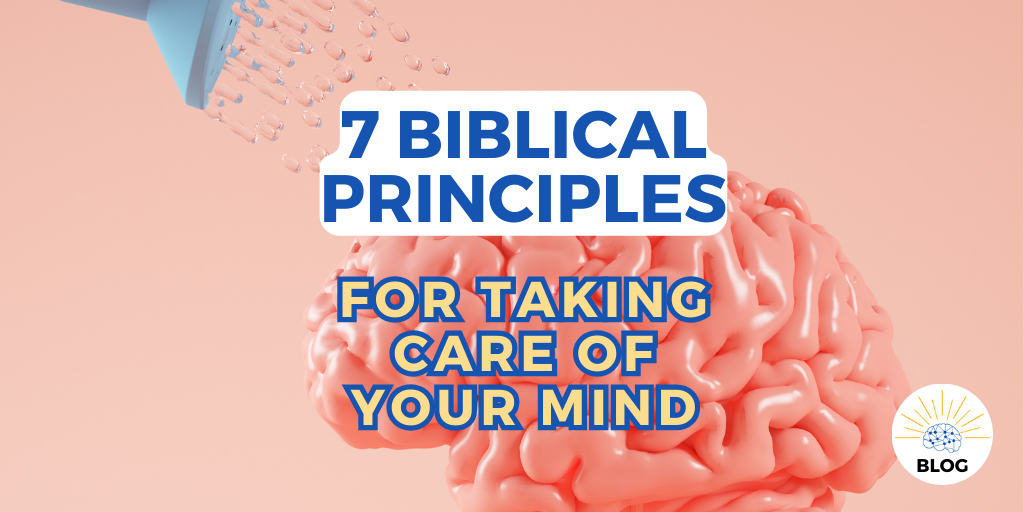This post is derived from two blog posts I wrote over on PastorBrad.blog and KatieRDale.com.
The Bible is full of wisdom for living a successful, God-honoring life. We are to love the Lord our God with all our heart, soul, mind, and strength. If we want to address our personhood in full, we can’t overlook our mind and how we handle its health. The following principles are derived from passages in Scripture that can help us understand how God values our mental well-being and the spirit seated within.
Principle #1: Express your hurts and frustrations
In numerous passages in the Psalms, we see David cry out to the Lord in his pain and troubles. Examples of his fears, doubts, hurts, and sorrow can be found throughout the book of Psalms.
As a general interpretation, David’s example sometimes echoes and foreshadows the pain and trials Christ ends up enduring hundreds of years later.
There is nothing unacceptable about letting God know exactly how we feel. Being authentic and identifying our true feelings is our first step in healing.
This also deepens our relationship to Him as He can better minister to us once we’ve opened our heart to Him.
Principle #2: Call on God’s name and cling to His promises
God wants us to call on His name and instructs us to in many places in the Bible (Acts 22:16, Romans 10:13, 1 Corinthians 1:2, 2 Timothy 2:22). It usually comes in the form of a promise too, assuring His children that when we call our God by name, He is faithful and able to meet us where we are at and help move us forward.
In our mental health, sometimes there seems to be a dead-end or a huge roadblock. Perhaps we’re stuck in depression or continuing in a battle of anxiety.
God challenges us that no matter the situation, when His name is called on, He will deliver.
Sometimes that’s all a prayer has to be.
“The name of the Lord is a strong tower; the righteous run into it and are safe” (Proverbs 18:10).
Principle #3: Account for your thoughts
“For the weapons of our warfare are not carnal but mighty in God for pulling down strongholds, casting down arguments and every high thing that exalts itself against the knowledge of God, bringing every thought into captivity to the obedience of Christ, and being ready to punish all disobedience when your obedience is fulfilled” (2 Corinthians 10:4-6).
This verse couldn’t be clearer. There are a few reasons why this order in practice can be helpful to our mental health.
For one, accounting for what enters our mind, stays in our mind, visits our mind, and what we allow to entertain us in thoughts can directly influence our feelings and behaviors.
This is a simple, known principle even in psychology: what and how we think will affect our feelings and behaviors.
But God’s laws are as universal as the laws of science, so it would align with a science-based tenet, wouldn’t it?
God knew what he was talking about when he gave this command through the Apostle Paul.
You might of heard the saying, “Change your mind, change your life.”
When we become alert and mindful of the thoughts in our head, we can identify what is true and of Christlikeness, and what is half-true or entirely false.
Identify with the Truth, filtering each of our thoughts through God’s Word, and we’ll improve our outlook on life significantly.
Principle #4: Come clean and clear
This principle is also about sharing our faults and asking for forgiveness from others. In order to live in harmony with others and God, we need transparency.
It’s important to God that we confess our sins to others to be in right relationship with God and them (James 5:16). Not just so we can have a clear conscience, which would improve our mental health, but to heal in our relationships.
This can have an impact on our personal growth, because acknowledging our trespasses and mistakes brings them to light. What is exposed in the light cannot continue to thrive. Naming our sins within the context of one or two trusted Christians is the pivoting our mind must take to transform and turn from sin.
Like someone struggling with lust and the temptation to be sexually immoral, sharing the sin with a trusted counselor or close accountability partner can help get reframe the sin and motivate them to repent.
Guilt and shame will have less power over them, and they can continue in grace through the power Christ bestows.
Principle #5: Cast your worries onto God
Taking on our own troubles and things we can’t control can be too much for our minds to handle.
This principle is about relinquishing control over our worries and resting in God’s peace, as it says in 1 Peter 5:6-7:
“Therefore humble yourselves under the mighty hand of God, that He may exalt you in due time, casting all your care upon Him, for He cares for you.”
We spend too much energy and time thinking about things that won’t change. The more we stress, the more it’s not good for our mind or body’s health. It can become a bad habit and a vicious thought cycle.
Trust that God cares just as much and expressly wants you to trust Him enough to confide in Him what is bothering you. That would not only improve your thought life but enlarge your trust in Him.
Principle #6: Take care of yourself with medicine, if necessary
In 1 Timothy 5:23, Paul instructs Timothy to take a little wine for an upset stomach and “frequent infirmities.” The exact dosage is not necessary to know, just as the exact medicine is not within a Biblical text regarding our psychiatric medicines.
But we can’t deny that medicine for our mind is a necessary and much-needed thing to treat our mental illnesses.
When our minds are missing the chemicals they need to produce a balanced, functioning output, we have the gift of modern-day psychiatric medications.
Had I been born 100 years earlier (that’s 1887), I would’ve ended up institutionalized or worse, had a lobotomy procedure done. A frightening thought but sobering to think how far society, science, and pharmacology have come.
When we need them, we take the “seek and find” principle (trial and error as I mentioned in Pastor Brad’s blog post), and over time we find the best combination dosage possible.
Working with our prescribing psychiatrist and actively participating in talk therapy can be the best practice for a fractured mind.
There’s nothing unbiblical about that, as God cares for our whole well-being out of love for us.
Principle #7: Give thanks through all of it
Need I say more?
Thankfulness is linked to levels of happiness in scientific studies, and for good reason.
Giving thanks opens up our attitude to embrace life no matter the circumstances. When we’re grateful, we welcome all that God has brought us through and will bring us to.
“Give thanks in all circumstances; for this is God’s will for you in Christ Jesus.” (1 Thessalonians 5:18, NIV)
What an adventure when we are open and willing to be thankful and happy for all of it.
His light shines brighter. People will wonder what reason we have for that hope, and we can tell them: Jesus.
Who else do we need?
Discover more from Delight in Disorder
Subscribe to get the latest posts sent to your email.







